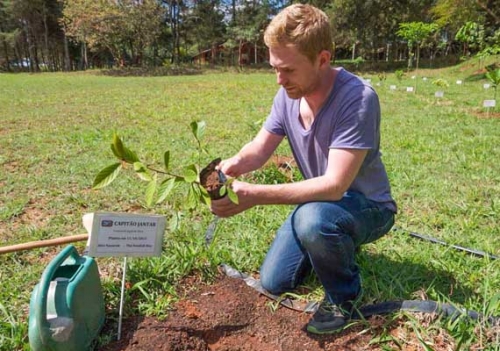Mastering The Art Of Cupping In Brazil
Although my week at Daterra was largely devoted to coffee, I cannot overlook the food enjoyed during my time on the farm. The people of Minas Gerais really know how to eat. So much so, I was starting to wonder whether they grew coffee simply to drag them out of a post-meal food-induced slumber. And no matter how much they eat, they will always find room to finish every meal with a huge slab of cheese and a dollop of doce de leite. My host Gabriel made the mistake of telling the kitchen staff that I was partial to a decent meal. This is what greeted the two of us for dinner one night...
The people of Minas, as is evident from their portion sizes, relish a challenge. After spending time in the fields and observing the production process, they wanted to put my taste buds to the test and so I agreed somewhat reluctantly to compete in a coffee tasting session with their "master cupper." Would the years splashing out on expensive single-estate coffee finally offer some form of recompense? Or was this the moment they discovered that despite my self-proclaimed love of food I have a pretty poor palate? I hoped Foodish Boy would not be exposed as a phony. The pressure was on...

Daterra's master cupper is king of the coffee supply chain: his palate is the gateway between producer and consumer. Only their master cupper, after tasting a tiny sample of the estate's beans, can give the go ahead for harvest to start. They travel, taste, and train for years to perfect their palate and during the three-month harvest period they will taste up to 30,000 cups of coffee. I should add that compared to the tea tasters I've met they are also a lot better behaved. (The tea estates sometimes slip a cup of gravy in the tea samples to make sure that after the lunchtime curry, whiskey, and cigarettes the tea tasters are still up to the job. Sometimes they are not!)
A cupping session is a very structured process. Ten grams of ground coffee is brewed with 150 milliliters of water for four minutes. For each coffee sample, there are three cups brewed to allow for any anomalies in the samples. The cupper/taster has a chart with 10 columns, which correspond to aspects of aroma, taste, and mouthfeel. Each aspect is given a mark out of 10 and at the end of the exercise the coffees are scored out of 100. Because Daterra produces only specialist coffee, the scores should not drop below 80. The session begins with smell, first sniffing the beans, then again when water is poured over and finally at the end of the four minutes when the top layer of the brew is tapped with a spoon to release the freshly brewed aromas (known as cracking).
Next is taste. You take a decent spoonful of the coffee liquor and slurp it into your mouth (the slurp helps aerate the liquor and release the flavors). The coffee is then swirled around your mouth before spitting the liquid into a cup. Finally the tasting step is repeated taking into account attributes of mouthfeel, overall quality, and consistency. Coffee tasting is certainly not a graceful activity, and going about the process shyly will result in either not tasting much or dribbling a lot of coffee down your shirt.
My test started well. Amazingly I was able to pick out certain aromas in the coffee. But the more I started to think about certain aspects, the more confused I got. "Did I just get a hint of chocolate? Or wait... was that vanilla? Oh Christ... maybe it was chocolate after all." And when I moved on to tasting, things got even more confusing; trying to mark for acidity, aftertaste, body, balance, and other attributes on one slurp was extremely difficult. While the master cupper whizzed around the table, I took several attempts to make up my mind. Then there was the problem of marking everything out of 10. With no prior cupping experience what the hell was I supposed to compare it against?
An hour or so later I looked over my charts, feeling completely hopeless and a bit of a fool. Finally came the moment of truth. I sat down with the master taster to compare our notes. To everyone's surprise we had pretty similar scores and remarks. My only serious slip-up was scoring the best quality coffee with the lowest mark. But as the taster explained, an extremely complex coffee is different on every taste, so while he rewarded this with a high score, I had become frustrated and confused and scored it low.
The master cupper was so pleased with my effort that he said he had a little surprise in store for me. Initially, I thought this was a trip the edge of the estate to watch one final beautiful sunset. But little did I know the treat was yet to come...

On my last morning Daterra had selected a tree for me to plant — a variety chosen especially for its name Capitano Janitar (Captain Dinner) — they assured me despite their best attempts they could not find a Foodish Boy species. "No matter where you are in the world Alex, you will always have roots in Brazil. Our home is now your home," Gabriel told me. Teary eyed, I thanked the team for an incredible week. In Brazil they say to become eternal you need to do three things: Plant a tree, write a book, and have children. One down. Two to go...